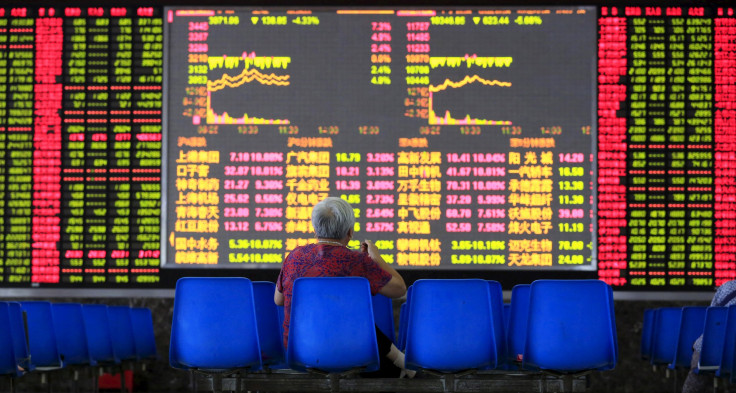Asian Markets: China's Stock Market Rout Drags Down Tokyo Shares

China’s stock market rout continued Tuesday, as the main Shanghai Composite Index slumped 7.7 percent, following the previous day’s fall of almost 8.5 percent. The continuing decline also dragged down shares in Tokyo, where the Nikkei closed almost 4 percent lower, though other Asia Pacific markets rose.
A roller-coaster day on the Chinese markets saw stocks slump, rebound and then plunge again, as an injection of more than $23 billion of funds into the market by the Chinese authorities failed to calm market sentiment.
The Shanghai Composite Index finished more than 244 points down at 2,962 -- the first time since the early stages of its boom last December that it had closed below the 3,000 mark. The secondary Shenzhen Composite Index also fell more than 7 percent, while Shenzhen’s Nasdaq-like market for small and high-tech enterprises, the ChiNext index, finished 7.5 percent lower.
Rattled by these falls, Tokyo’s Nikkei reversed a morning rise of more than 1 percent to fall sharply in afternoon trading. Hong Kong’s Hang Seng Index also fell sharply in early afternoon trading, before recovering to close 0.7 percent higher at 21,404.
Analysts said Chinese investors were disappointed that, despite Tuesday’s short-term injection of government funds, the authorities had still not taken the widely predicted step of lowering the bank reserve requirement ratio. This would not only make borrowing cheaper and thus provide a boost to industrial firms, which have been hit by slumping export orders, but was also hoped for as an important psychological symbol that the authorities still intended to intervene to boost the market.
“From the macro-economic point of view a cut in the reserve requirement ratio is needed, to reduce the high funding and borrowing costs for Chinese firms,” Li-Gang Liu, chief economist for Greater China at ANZ Banking Corp. in Hong Kong, told International Business Times. However, he said it appeared that the authorities “perhaps don’t want to cut the rate when there is such a big market rout,” for fear that “this type of policy easing would be seen as an action of weakness.”
Liu also suggested that China’s central bank, the People’s Bank of China, now has other important policy objectives to focus on, “such as encouraging more structural changes and reform” in China’s economy, and therefore keeping the bank lending rate high “could be good for firms to rebalance. I think they’re feeling that lower capacity firms should be driven out of the market, rather than using a low interest rate to help them out.”
And there is a growing sense that the Chinese government may have decided that it can no longer continue the massive injection of government money that helped prop up the stock market when it slumped in July. Angus Nicholson of IG markets in Sydney believes that the authorities decided at a key leadership meeting earlier this month that daily interventions were "costing the government too much money," the Guardian reported Tuesday.
Certainly some Chinese investors are no longer expecting major government support, of the type which saw state-backed funds invest in a massive buying spree in the first half of July. One veteran Shanghai-based investor, who asked not to be named, told International Business Times that he quit the market when it began to fall from its peak of over 5,000 points in June, and is not planning to buy in again. He said he believed the authorities had “used up most of their ammunition” to prop up the market, and that they would now focus more on issues such as China’s exchange rate, as evidenced by this month’s devaluation of the yuan.
Such an approach appears to undermine the government’s hopes of using the stock markets to raise capital to fund the modernization of the country’s economy. However, the official Global Times newspaper said in a commentary Tuesday that what it called “unusual short-term jitters" would not change the fact that China’s economy was still “one of the best” in the world. The paper also quoted a Chinese academic who said that “market-oriented” reforms of the financial markets, including steps to reduce government interference in which companies are allowed to list, would still go ahead.
And ANZ’s Liu said that while there are real concerns about the slowdown in China’s growth, and what he saw as relatively slow policy reaction to the situation, he did not believe that China’s stock market – which is notoriously volatile, and still remains some 50 percent higher than its level of just over a year ago – should continue to pull global share prices down, even if it continues to fall.
“The Chinese equity market is still very much self-contained,” he said. “It’s not directly connected with the rest of the world other than Hong Kong – and the foreign players are quite small and not very influential.”
Liu added that Tuesday’s rise on bourses, including Australia’s, where the ASX200 index closed 2.4 percent higher, showed that “there was some panic yesterday and the markets have oversold. Now I think we’re probably seeing some kind of a rethink on these more mature markets.”
© Copyright IBTimes 2024. All rights reserved.





















